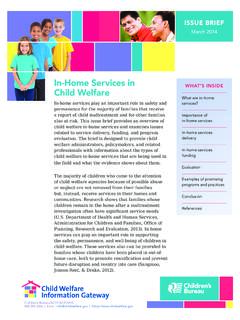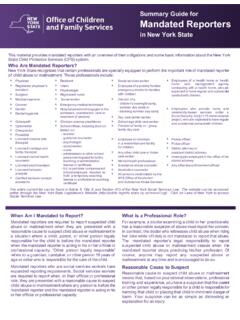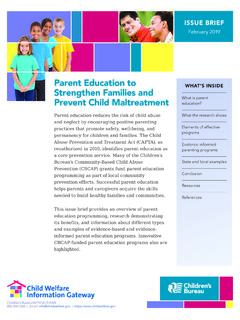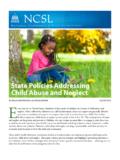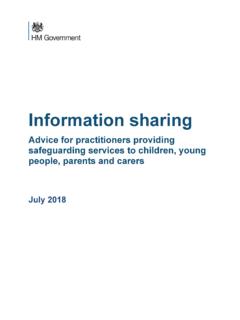Transcription of The Family Nurse Partnership Programme - GOV.UK
1 The Family Nurse Partnership Programme Information leaflet The Family Nurse Partnership Programme 2 DH INFORMATION READER BOXP olicyClinicalEstatesHR / WorkforceCommissioner DevelopmentIM & TManagementProvider DevelopmentFi nancePlanning / PerformanceImprovement and EfficiencySocial Care / Partnership WorkingDocument PurposeGateway ReferenceTitleAuthorPublication DateTarget AudienceCirculation ListDescriptionCross RefSuperseded DocsAction RequiredTimingContact Details133-135 Waterloo RoadThe Information Leaflet will provide a detailed overview of the Family Nurse Partnership Programme in England. It also includes additional information for commissioners. N/AFamily Nurse Partnership National UnitJuly 2012 PCT Cluster CEs, NHS Trust CEs, SHA Cluster CEs, Foundation Trust CEs , Directors of Nursing, Local Authority CEs, PCT Cluster Chairs, NHS Trust Board Chairs, Allied Health Professionals, GPs, Directors of Children's SSs, Other interested parties, including media#VALUE!
2 N/AN/AN/A017581 For InformationFor Recipient's UseThe Family Nurse Partnership Programme : Information LeafletLondon SE1 8UG020 797 21295 June BoggisDepartment of HealthG17 Wellington House Crown copyright 2012 First published [December 2010] Published to DH website, in electronic PDF format only. The Family Nurse Partnership Programme 3 The Family Nurse Partnership Programme Information leaflet Prepared by Family Nurse Partnership National Unit The Family Nurse Partnership Programme 4 Contents General Information .. 5 Additional information for commissioners .. 9 5 General Information What is FNP? FNP has three aims: to improve pregnancy outcomes, improve child health and development and improve parents economic self-sufficiency. FNP is a voluntary, preventive Programme for vulnerable young first time mothers. It offers intensive and structured home visiting , delivered by specially trained nurses, from early pregnancy until age two.
3 A strong and rigorous US evidence base, developed over 30 years, has shown FNP benefits the most needy young families in the short, medium and long term across a wide range of outcomes helping improve social mobility and break the cycle of inter-generational disadvantage and poverty. The Government made a commitment in October 2010 to double the number of places on FNP, to 13,000 places by 2015. There are now around 9,000 places in 74 teams in 80 local areas. How does FNP work? FNP uses in-depth methods to work with young parents, on attachment, relationships and psychological preparation for parenthood. Family Nurses build trusting and supportive relationships with families, guide first-time young parents and use behaviour change methods so that they adopt healthier lifestyles for themselves and their babies, provide good care for their babies and toddlers, and plan their futures. The Programme offers a schedule of structured home visits which can be weekly, fortnightly or monthly and which last between one and one and a half hours.
4 Nurses are guided in their work through detailed visit-by-visit guidelines that reflect the challenges parents are likely to confront during pregnancy and the first two years of the child s life. Within this framework nurses use their professional judgement to address those areas where needs are The FNP model draws from three distinct strands of theory: human ecology, self-efficacy and attachment. These theoretical strands, woven together within a professional nursing framework, produce a unique preventive Programme of great depth, breadth and vitality. FNP has a specific way of working with the most vulnerable families, taking advantage of an expectant mother s intrinsic motivation to do the best for her child and working to develop and expand the strengths within a Family to promote change. Who is eligible for FNP? Enrolment and participation is voluntary. The criteria for women to be offered the FNP are: 1 , The Family Nurse Partnership Programme 6 All first time mothers age 19 and under at conception Living in the agreed catchment area Eligible if previous pregnancies ended in miscarriage, termination, still-birth, multiple births included.
5 Enrolment should be as early as possible in pregnancy and no later than the 28th week of pregnancy. 60% should be enrolled by the 16th week of pregnancy. Women are excluded from the Programme if they plan to have their child adopted or they have had a previous live birth. What happens when the child reaches the age of two? From the outset parents know that FNP ends when their child is two years old. Throughout this time the Family Nurse works with parents to help them to become confident and independent and to make best use of local services, in particular Children s Centres. FNP includes materials and activities on actively planning for the future and ending relationships well and preparation begins well before the end of the Programme . All families will be transferred to health visiting services so the remainder of the Healthy child Programme can be completed. Why does FNP have to be delivered by those from a nursing or midwifery background?
6 The US evidence for FNP shows significantly improved outcomes for vulnerable young families when FNP is delivered by high quality experienced nurses, and delivery by nurses is therefore a licensing requirement. There are a number of reasons for this for example we know that nurses are trusted by the public, respected as a caring profession and have academic preparation in the social, life and caring sciences. They also have unique knowledge that appeals to a first-time mother who will have many questions and concerns about her health and the baby s health. Finally, the FNP Programme itself is high intensity and demands a high level of professional expertise. The US Denver trial compared outcomes between Nurse -visited and paraprofessional-visited groups, and found the nurses outcomes for clients were generally twice as strong as those of the paraprofessionals. In England, Family Nurses mainly have a health visitor, midwifery or community health background giving them the expertise needed to deliver this complex clinical Programme .
7 The evaluation of the first ten FNP sites in England conducted by Birkbeck, University of London, found that FNP nurses are highly valued by their clients and welcomed into their homes. Why is FNP a licensed Programme ? If evidence-based programmes are diluted or compromised when implemented, research shows that they are unlikely to replicate the benefits. For this reason the University of Colorado, who developed FNP, licensed it to ensure that it is delivered in accordance with the original Programme model and so we can be confident that children and families are likely to benefit. The Family Nurse Partnership Programme 7 The license sets out core model elements covering clinical delivery, staff competencies and organisational standards to ensure it is delivered well. The license is held in England by the DH. The DH FNP National Unit supports sites to deliver the Programme and monitors fidelity to the licensing conditions. What does it mean to deliver a licensed Programme ?
8 As a licensed Programme , FNP specifies what should be delivered, to whom and what outcomes can be expected once the nurses have learned how to deliver it well. It ensures that commissioners are provided with data on delivery and Programme impacts. Nurses are guided by visit by visit guidelines and use their professional skill and expertise to tailor these to each individual client and their baby. The structure, methods and materials the Programme provide mean they can be clear and confident about what they have to do and when, freeing them up to concentrate on how to deliver FNP well. What evidence is there that FNP makes a difference? 30 years of high quality US research into FNP has shown significant benefits for vulnerable young families in the short, medium and long term across a wide range of outcomes including: improvements in antenatal health reductions in children s injuries, neglect and abuse improved parenting practices and behaviour fewer subsequent pregnancies and greater intervals between births improved early language development, school readiness and academic achievement increased maternal employment and reduced welfare use increases in fathers involvement NFP ( Nurse Family Partnership in the US) is consistently rated by rigorous evidence reviews as the best evidence-based preventive early childhood Programme .
9 In a review by the Lancet, FNP (MacMillan 2009) was cited as the strongest of one of only two programmes shown to prevent child maltreatment. What about research in this country? We are committed to strengthening the evidence base for FNP in an English context. A three year formative evaluation of the first 10 sites in this country has been carried out by Birkbeck, University of London and a large scale randomised control trial, involving 18 of the sites, is underway. Issue -specific research to support the effective implementation of the Programme is also underway. This includes looking at the costs associated with running the Programme locally and understanding the FNP workforce in order to be able to support the growth of the Programme . The independent randomised control trial is being led by the South East Wales Trials Unit at Cardiff University in collaboration with Universities of York, Bristol and Glamorgan. The study, known as Building Blocks , will assess whether FNP benefits women, children and families The Family Nurse Partnership Programme 8 over and above usual services as well as its cost effectiveness in the UK and is due to report initial findings when the children are aged 2 in early 2014.
10 What does the formative evaluation in England tell us? The formative evaluation of the first 10 pilot sites completed in 2010 suggests that the Programme can be delivered well in England, families like it and think it is making a difference and also that the potential for impacts is promising. More specifically: There are early signs that clients now have aspirations for the future and cope better with pregnancy, labour and parenthood Clients are reducing smoking during pregnancy Breast feeding initiation is higher than national rate for same age group (FNP = 63% UK under 20s=53% ) Mothers also had significantly improved mastery, a form of self esteem linked to positive behaviour change, at the end of the Programme compared to the start. Clients were returning to education and employment, making regular use of effective birth control methods and spacing subsequent pregnancies. FNP children also appear to be developing in line with the population in general which is very promising as this group usually fare much worse.










